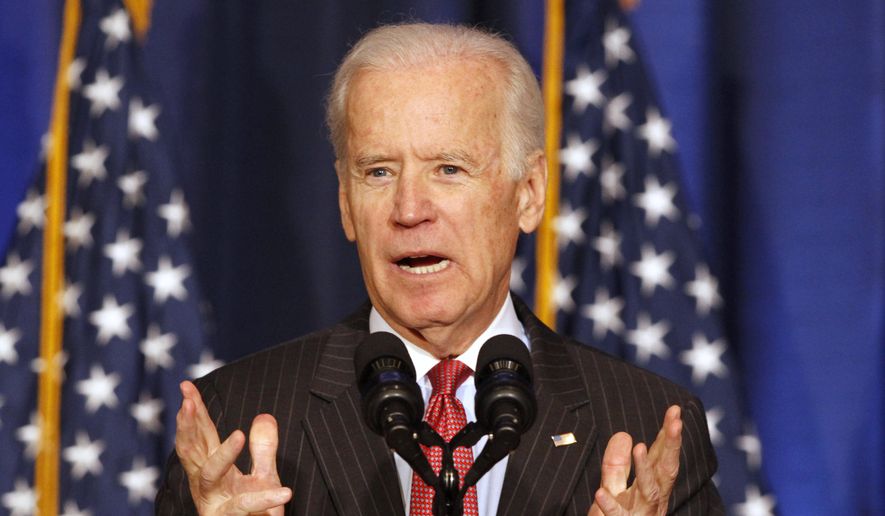When it comes to Iraq, Vice President Joseph R. Biden was for partitioning the county before he was against it.
In a sign of how the Obama administration’s Iraq policy has been all over the map, Mr. Biden gave an impassioned speech Thursday about the importance of Iraqi national pride and a strong federal government in countering the Islamic State terrorist group.
“We want what Iraqis want: a united, federal and democratic Iraq as defined by its own constitution, where power is shared among all Iraqi communities,” Mr. Biden said at the National Defense University in Washington. “When the three major constituencies — Sunni, Shia and Kurd — are united in wanting a whole and prosperous Iraq, the likelihood of being pulled into the orbit of any single nation in the region is diminished exponentially.”
That formulation sounded to some like a reversal from Mr. Biden’s position in 2006, when as chairman of the Senate Committee on Foreign Relations he advocated dividing Iraq into three regions — Kurdish, Shiite and Sunni — with a minimized central government. Back then, Mr. Biden said the best way to prevent Iraq from splitting over sectarian violence was to decentralize it, “giving each ethno-religious group room to run its own affairs.”
Foreign policy analysts noticed Mr. Biden’s shift.
“I found it interesting that Biden would have to walk back this idea of the tripartite division of Iraq, since he’s the one who really inserted it into the conversation back in 2006,” said Michael Rubin, a specialist on Iraq and the Middle East at the conservative-leaning American Enterprise Institute. “Now they recognize that they have to live together.”
Mr. Biden even chided unspecified critics for saying “that Iraq itself is likely to be a thing of the past, doomed to split apart because of sectarian violence.”
“There’s just one problem with these critiques: The claims do not reflect the circumstances on the ground,” the vice president said Thursday.
An aide to House Speaker John A. Boehner, Ohio Republican, said Mr. Biden’s evolving views on Iraq are becoming comical.
“As a senator, Vice President Biden publicly advocated dismembering the Republic of Iraq along sectarian lines,” said Boehner spokesman Michael Steel. “As vice president, he led the effort for an early and unwise withdrawal in 2009 and failed to reach a crucial status-of-forces agreement to protect American troops. His record of poor judgment and failure makes him a laughable choice as the face of the administration’s efforts in Iraq.”
Mr. Rubin also said it was telling that President Obama, who put Mr. Biden in control of Iraq policy during his first term but moved him to the sidelines when the Islamic State crisis emerged last year, chose not to give the speech himself. Mr. Obama is in Panama for a summit.
“The very fact that Biden represents the head of the Iraq portfolio shows just how secondary it’s become to the administration,” Mr. Rubin said.
The vice president’s office didn’t respond to requests for comment about the criticism.
Iraqi Prime Minister Haider al-Abadi is scheduled to make his first visit to Washington next week. Mr. Obama, who withdrew all U.S. forces from Iraq in 2011, has sent about 3,000 U.S. troops back to the country as military advisers since last year and has ordered airstrikes to counter Islamic State fighters in Iraq and Syria.
The Islamic State still holds about one-third of Iraq and Syria, but Iraqi ground forces backed by U.S.-led airstrikes have retaken the city of Tikrit. Mr. Biden, who referred to the terrorist group by its acronym, rebutted critics for saying “that ISIL remains in a commanding position inside Iraq.”
“Eight months ago, ISIL was on the offensive everywhere in Iraq,” Mr. Biden said. “But today in Iraq, ISIL has lost large areas that it used to dominate. ISIL’s momentum in Iraq has been halted and in many places has been flat-out reversed.”
He said there is still “a long fight ahead.”
“The jury’s still out, that’s the truth,” Mr. Biden said. “It’s not over yet. But the momentum is in the right direction. I don’t want to paint an overly rosy picture. But ISIL’s aura of invincibility has been pierced, and that’s important.”
He praised Mr. al-Abadi’s leadership for forming a more inclusive government among Sunnis, Shiites and Kurds to wage a more coordinated fight against the Islamic State.
“It actually united Iraqis,” he said of the Islamic State’s rise. “They each concluded they were better off if they were in this together. The Iraqis themselves recognized how badly the trust had been broken among them.”
• Dave Boyer can be reached at dboyer@washingtontimes.com.




Please read our comment policy before commenting.